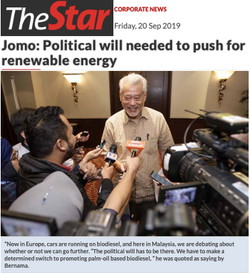- Aug 26, 2025
- 4 min read
CAMPINAS, Brazil, Aug 26 2025 (IPS) - The Global South had little voice, let alone influence, in shaping the economically ‘neoliberal’ and politically ‘neoconservative’ globalisation leading to contemporary geopolitical economic conflicts. Pacifist non-aligned cooperation for sustainable development offers the best way forward.
Peace, Freedom, Neutrality
Realising non-alignment for our times should begin with current realities rather than abstract, ahistorical principles. 2025 is also the 70th anniversary of the beginnings of non-alignment, first mooted at the Asia-Africa summit in Bandung, Indonesia.
The Association of South-East Asian Nations (ASEAN) was established in 1967 by anti-communist governments of the region. In 1973, its leaders agreed the area should be a Zone of Peace, Freedom, and Neutrality (ZOPFAN).
The world was deemed unipolar American discourse after the first Cold War. Meanwhile, most of the Global South remained non-aligned in what the Rest see as a multipolar world.
Despite critical dissent, the West seems to have lost interest in preserving peace. Unsurprisingly, the US and its NATO allies increasingly ignore the United Nations. Foreign military interventions since the first Cold War already exceed the many of that longer era.
During World War II, military production generated growth and employment in Germany, Japan and the US. But surely, development today is best achieved peacefully and cooperatively.
Pacifist non-alignment should cut unnecessary military spending. Although big powers compete for hegemony by weaponising international relations, they will still try to ‘buy’ support from the non-aligned.
Realistically, most small developing nations cannot lead international peace-making. But they can and should be a stronger moral force urging justice, peace, freedom, neutrality, development, and international cooperation.
Return of the Global South
The Group of 77 (G77) developing countries’ caucus and the UN Conference on Trade and Development (UNCTAD) were both established in 1964. Headquartered in Geneva, UNCTAD is part of the UN Secretariat but has been steadily marginalised.
The G77 has a formal presence throughout the UN multilateral system. It now has over 130 members, including China, but its impact outside New York in recent decades has been limited.
Sustainability challenges and planetary heating are generally worse in the tropics, where most people in developing countries are. Meanwhile, hunger worldwide has worsened since 2014, while World Bank-reported income poverty has risen since the COVID-19 pandemic.
An inclusive and equitable multilateralism can better address the world’s challenges, especially peace and sustainable development – so crucial for progress in our dark times.
Global South needs better voice
While working for Goldman Sachs, Lord Jim O’Neill referred to Brazil, Russia, India, and China as the BRIC countries.
With South Africa joining, ostensibly representing Africa, they soon began meeting regularly. As members of the G20 group of the world’s twenty largest economies, the BRICS initially lobbied on financial issues.
They have since incorporated other large economies of the South, but also incurred the wrath of President Trump. While some nations have sought to join the enlarged BRICS plus (BRICS+), a few have hesitated after being invited.
BRICS has no record of strong and consistent advocacy of the interests of smaller developing economies. Most financially weak small nations doubt that BRICS+ will serve them well.
Higher US interest rates have triggered massive capital inflows, especially from the poorest countries, depriving them of finance at a time of greater need.
Meanwhile, aid levels have fallen tremendously, especially with Trump 2.0. Official development assistance (ODA) to the Global South is now below 0.3% of GDP, less than half the 0.7% commitment made in 1969.
Lowering tax rates has further squeezed the West’s already limited budgetary resources as stagnation deepens. Trump’s tariffs, US expenditure cuts, and greater Western military spending deepen worldwide economic contraction.
Non-alignment for our times
The Global South must urgently promote a new non-alignment for multilateral peace, development, and international cooperation to address Third World challenges better.
Even IMF number two, Gita Gopinath, agrees that developing countries should opt for non-alignment to benefit from not taking sides in the new Cold War.
With the exception of Brazil’s Lula, leadership by statesmen with international standing beyond their national stature largely passed with Nelson Mandela.
A few dynamic new leaders have emerged, but have not taken on the responsibilities of Global South leadership. Such leadership is in short supply despite the urgent need.
It is much easier to revive, reform, and reinvigorate NAM than to start from scratch. Although it has been less influential in recent decades, it can be revitalised.
Also, foreign policies are typically less subject to other typical national domestic policy considerations. Hence, they do not vary as much with the governments of the day.
Also, most developing country governments must appear to protect national interests to secure political support and legitimacy for survival.
Hence, conservative, even reactionary governments may take otherwise surprising anti-hegemonic positions in multilateral fora, especially with growing widespread resentment of bullying for extortion.
Related IPS Articles:
Available online at: A New Non-Alignment for the Global South




















